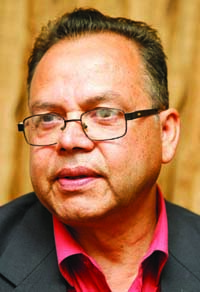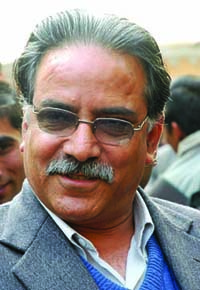 |
 |
Nepal's situation is not so different. The Maoists and UML have been in a relationship since the seven-point deal between their party chairmen, which paved the way for UML's Jhala Nath Khanal to become PM. Nepali Congress, for all its recent bungling, still has at least two aces up its sleeve. For a truly effective coalition would be one between the Maoists and Nepali Congress, with UML and the Madhesi parties playing a supporting role.
Ego, pigheadedness and the personal ambitions of their leaders, along with a heavy dose of suspicion about each other's intentions, have however pushed the Maoists and Nepali Congress further apart. Neither the peace process nor the constitution will see the light unless these two come together.
The reasons, if they needed any reinforcement, are obvious.
It has taken less than two months for the parties to realise � they are loath to admit it in public, though � what a mess they have created. Khanal's is already a non-functioning government, and not just for his failure to give full shape to his cabinet even two months since he took over as the top executive of the country.
This is an unnatural coalition, even though it is heavily communist in character, with the country's two leading communist parties and an ex-communist led Madhesi party being part of it. President Yadav has pointed out that decisions by the coalition (which as a two-thirds majority in the CA) will have no meaning if such decisions don't have the political backing of all the major political forces. More than the numerical two-thirds, President Yadav said, a political two-thirds majority is the need of the hour. One may accuse him of overstepping his constitutional brief, but beneath the planted news of a PM said to be 'unhappy' about the president's statement, there is a much-needed nudge to reverse the slide downhill.
The whole idea about acting as per the mandate of the people expressed through their ballots, and embracing the reality of post-conflict transition, was always pointing to one direction � a government led by the Maoist party and to be more specific, Pushpa Kamal Dahal. The chairman can say all he wants, shout himself hoarse over India's meddling in internal politics (not unjustified, as recent events corroborate his allegations), and issue threats. But he and his party cannot afford to ignore Nepali Congress. He needs to speak to those in the party with whom he first got in touch to effect the 12-point agreement, agree to implement the agreements on integration/rehabilitation of Maoist combatants, and agree on constitution-drafting. In return, Nepali Congress must unequivocally say it is the Maoist party that should lead the government.
Nepali Congress' sidelining in national politics notwithstanding, the Maoists would do well to take its threat seriously: that Nepali Congress will not allow the promulgation of the constitution unless the Maoists honour their commitment on ex-combatants. It is right in asserting that there cannot, and should not, be another election with the Maoist party still effectively commanding the reins of a private army. If Dahal-Khanal refuse to listen and try to go ahead as per their seven-point deal, it will lead to what no democrat in the country wants to see happen: the dismissal of the Khanal government by President Yadav around 28 May with the covert backing of Nepali Congress and other political parties, including a powerful faction of UML.
The Nepali Congress threat is not an empty one. They know that the president is ready to act out his role as protector of the constitution with the army standing firmly behind him.
May better sense prevail.
[email protected]



